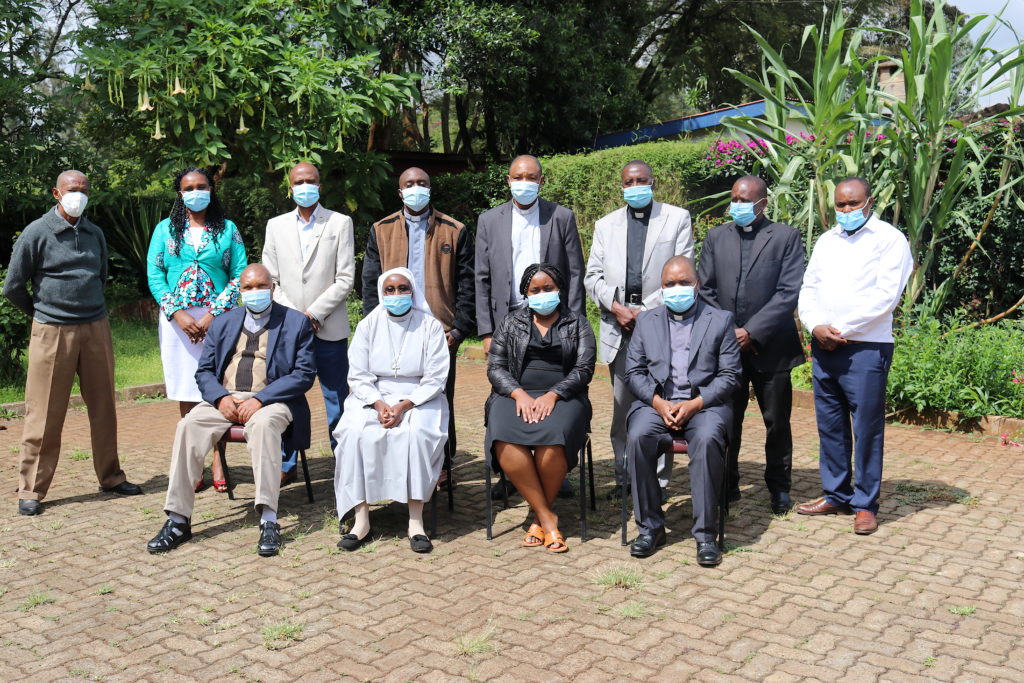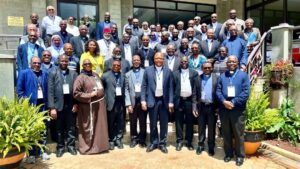AMECEA: Pastoral Department Spearheads Development of Regional Chaplaincy Manual

AMECEA: Pastoral Department Spearheads Development of Regional Chaplaincy Manual
Sr. Jecinter Antoinette Okoth, FSSA
In an attempt to respond to the request made by Association of Member Episcopal Conferences in Eastern Africa (AMECEA) bishops after the 19th Plenary Assembly in Addis Ababa, Ethiopia in 2018, for the region to have a chaplaincy manual, the Pastoral Department at AMECEA Secretariat has commenced the process of developing a handbook that can be used for reference when carrying out the ministry.
“The bishops saw a gap that was existing in the chaplaincy sector in the region. Knowing that the ministry has various categories including chaplaincy for the hospitals, military, youths and different other apostolates in the Church, they thought of developing a handbook to assist the member conferences in doing this apostolate,” AMECEA Pastoral Coordinator Fr. Emmanuel Chimombo shared with AMECEA online Tuesday, May 11.
Fr. Chimombo said during the opening of a five-day training for a team working on the chaplaincy materials, “The bias of this workshop will be on the youths who are facing so many challenges and who had disclosed lack of accompaniment by chaplains and that some chaplains do not receive adequate training to do their work competently.”
According to AMECEA’s Pastoral Coordinator, the training that took place from May 10 to 14 at Subiaco Retreat Centre in Nairobi, involved experts, youth representative and chaplains working in schools, congregations, hospitals and in dioceses, “so that all concerns could be taken into consideration.”
Addressing the team at the opening of the workshop where some members were on-site while others were following virtually, AMECEA Secretary General Fr. Anthony Makunde highlighted that developing the chaplaincy manual is “an unfinished project in the region,” knowing that “chaplaincy ministry is not a luxury but a must.”
He recalled that some years back after a workshop by AMECEA themed “Shaping the Destiny of the People in the Region,” that was organized on the implementation of the Post-Synodal Apostolic Exhortation Africae Munus, there was a request for the region to “consider creating chaplaincies for parliaments, civil servants, the police in various countries so as to reach out spiritually to both government and civic leaders in order to steer them back to the right way,” since “In most cases African leaders err because they lack spiritual guidance.”
Fr. Makunde underscores further the necessity for the chaplaincy manual referencing the Apostolic Exhortation Africae Munus where Pope Benedict XVI noted that “It is good that bishops support chaplaincies within the Church’s universities and schools, and establish them in their public counterparts. The chapel will be, as it were, the heart of those institutions (and) it will enable students to encounter God and to stand in his sight.”
He observes that “the role of a chaplain has not been thought of to a required level in the region,” and wishes the team to bring about suggestions that will help bishops establish chaplaincy ministries in their respective dioceses and in the social and learning centers.
“It is my prayer that we also come up with ideas that will help the bishops address the cry of the youth who need people to accompany them especially when faced with difficulties,” Fr. Makunde added.
Stressing the need for youth chaplaincy in the region Fr. Henry Mathagu Mwaniki one of the participants shared in an interview that “young people need to be accompanied and to be equipped with skills for life by training them on the right characters, right attitudes and approaches so they can understand themselves, the Church and the world and have their rightful positions.”
Fr. Mathagu a member of the Salesians of Don Bosco congregation who has worked with the youths for several years in schools, parishes and even youth centres said, “Young people are the heart beat in the society and in the Church,” hence the need to improve on understanding them and listening to them.
“We don’t get into the shoes of the young people to understand their real needs. The parents, families and leaders impose their own image on them and they end up feeling lost and lonely,” the clergy who is in charge of Social Communications Department for the Salesian Province disclosed and continued, “this initiative focusing on chaplaincy is very timely and we need to refocus our energies, change our attitudes and even equip ourselves better to have the right understanding of the young people and bridge the gap.”


